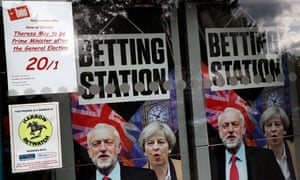
There was scarcely an odds-on chance in the main elections markets on Thursday morning that was not turned over when the votes were counted a few hours later, and shares in William Hill and Ladbrokes Coral plc rose steadily on Friday morning. Bookies love nothing more than a shock result.
The firms with off-course shops will also have welcomed the prediction by one industry analyst that the long-awaited review of stake levels in gaming machines may now be delayed still further, perhaps until the autumn. In the meantime, thousands of the Fixed Odds Betting Terminals (FOBTs) gaming machines will continue to rake in huge risk-free profits by offering punters the chance to gamble £100 every 20 seconds.
As and when it finally arrives, the review is expected to reduce the maximum stake on FOBTs to £20, or perhaps even £10, though some gambling industry executives were still holding out hope until Thursday that a majority Conservative government might be lobbied to maintain the status quo. That prospect has now receded, but the latest Conservative manifesto did not mention FOBTs, while Labour and the Liberal Democrats had promised a much more dramatic cut in the maximum stake, down to £2.
On the face of it, then, the bookies could be forgiven for breathing a sigh of relief. What is quite possibly the longest free lunch in British corporate history is set to continue for a little while yet, as each of their machines delivers £1,000 or so in profit each week with precise, mathematical certainty.
What the election result also suggests, however, is that in the longer term, the gravy is finally beginning to run out. Whether it is five years or five months until the next general election – and at this stage either seems equally plausible – the main opposition party will still be proposing, at the very least, a £2 maximum stake in FOBTs. If the Conservatives have an ounce of common sense, they will follow suit.
It is, in political terms, a gaping open goal with something to be gained and nothing at all to lose. As has been pointed out here in the past, opposition to FOBTs is one of those rare causes that unites the Guardian and the Daily Mail. There is a long list of reasons to object to the machines, from their addictiveness by design and the quick-fire opportunity to chase losses, to the economic and social blight of betting-shop clustering on the high street. It was, originally, a Labour government that legalised the machines (though as Harriet Harman, the party’s former deputy leader, has said, “if we had known then what we know now [about clustering], we wouldn’t have allowed this, because it’s not just ruining the high street, it’s ruining people’s lives”.
The big gambling firms, however, are still in denial. The free lunch has been going on for so long that they cannot bear to think that it might be cleared away. Many of racing’s senior executives are in denial as well. The sport, tacitly but still shamefully, sold itself to the machines when racecourses struck lucrative media rights deals on a “per shop” basis. When FOBTs are finally subject to the much tighter regulation they deserve, every shop that closes will leave a hole in racing’s finances too.
Have little doubt the day is coming, and the most sensible course of action for bookmakers and racing’s administrators would be to take a deep breath and admit it. There will be shop closures, no doubt about it, and necessarily so to alleviate the suffocating effects of clustering on high streets.
But there will always be a market for betting on the high street – in fact, it is well suited to it, as it was before the machines arrived about 15 years ago. And racing is the best betting medium around. There is much that racing and bookmaking can do to prepare for a future without high-stakes gaming on the high street, but first they will need to admit to themselves that the free lunch cannot go on forever
[Source”cnbc”]
